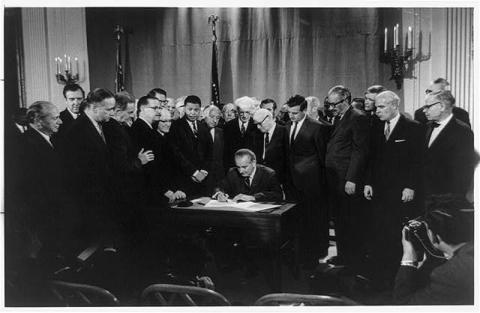Image

Description
The Civil Rights Act of 1968 was a landmark law in the United States signed into law by United States President Lyndon B. Johnson provided an avenue for equal housing opportunities regardless of race, creed or national origin and made it a federal crime to "by force or by threat of force, injure, intimidate, or interfere with anyone … by reason of their race, color, religion or national origin." Part of this act is commonly known as the Fair Housing Act and was meant as a follow‑up to the Civil Rights Act of 1964.
Source-Dependent Questions
- Look closely at the photo. Why would a group of people gather around President Johnson as he signed the Civil Rights Act?
- The 1968 Civil Rights Act was a follow up to the Civil Rights Act of 1964. Part of the Civil Rights Act of 1968 addressed equal housing opportunities regardless of race, creed or national origin. Discuss reasons why another Civil Rights act needed to be signed into law after the one signed in 1964.
- The Civil Rights Act of 1968 also made it a federal crime to "by force or by threat of force, injure, intimidate, or interfere with anyone… by reason of their race, color, religion or national origin." Discuss reasons why this specific language would be included in the Civil Rights Act.
Citation Information
Leffler, Warren K., "Lyndon Baines Johnson signing Civil Rights Bill," 11 April 1968. Courtesy of Library of Congress